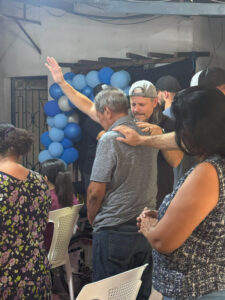If you’ve been waking up feeling stretched…
Anxious.
Stuck.
Detached.
Or silently exhausted—this one is for you.
Or maybe your mornings start off strong. You pray. You journal. You feel good.
But somewhere between the emails, the texts, the to-do lists, the peopling, and LIFE…
whatever happened in your prayer closet doesn’t translate into real life.
You’re fine when you wake up.
Triggered by noon.
And without even realizing it, you start scrambling.
For answers.
For information.
For clarity.
For something that will give you peace—or at least relief.
And then I say something that feels wildly unhelpful at first: What if clarity isn’t what you need first?
Oh great. Super helpful, right?
But hear me:
You don’t need clarity.
You need alignment.
As we’ve been talking about these last few weeks, alignment always precedes clarity.

Alignment isn’t balance.
It’s not control.
It doesn’t come from striving, proving, pushing, or performing.
Alignment is a place of surrender.
It’s a posture.
It’s allegiance.
It’s agreement.
It’s divine order.
And God has been teaching me something deeply personal in this season—something that has completely changed how I live my life.
Truth be told, this is a BIG topic…
but I learned it in the still, small beginnings of my mornings.
Yes.
My mornings.
And today, I want to give you insight into the actual morning rhythm that changed everything for me.
Because when your spirit, soul, and body are aligned, clarity follows. Or, as I always say, “When your mindset, hearset, and dreamset are aligned, everything works!”
But when they’re not, no amount of productivity—or prayer formulas—will fix it.
Did you notice I said rhythm and not routine?
That was intentional.
Let’s talk about the difference.
Routine:
A sequence of actions regularly followed.
A fixed program.
Something performed as part of a regular procedure—not for a special reason.
For many of you, you have a routine…but it’s not serving you.
So pause and ask yourself right now:
How do I actually get up in the morning?
Because here’s the difference most people miss:
Routine demands consistency at all costs.
Rhythm invites alignment with grace, season, and the Spirit’s leading.
A routine can keep you consistent—but a rhythm keeps you connected.
Connected to God.
Connected to yourself.
Connected to your current season.
Connected to the dream you’re called to steward.
Routine trains behavior.
Rhythm trains discernment.
Routine focuses on process.
Rhythm focuses on PRESENCE.
This is why alignment—not discipline—is so often the missing piece.
It’s rhythm, not routine.
I learned this when I was absolutely maxing out.

Alignment does start in the morning—yes, the morning—
but it continues with you all day long.
And Scripture shows us this pattern again and again.
Mark 1:35 (ESV)
“And rising very early in the morning, while it was still dark, He departed and went out to a desolate place, and there He prayed.”
Jesus didn’t wake early to be productive.
He woke early to be anchored.
Before demands.
Before crowds.
Before needs pulled on Him—
He centered Himself with the Father.
Genesis 22:3
“So Abraham rose early in the morning…”
God had just asked something emotionally impossible.
Abraham doesn’t stall.
He doesn’t negotiate.
He rises early and moves obediently.
Exodus 24:4 (ESV)
“And Moses wrote down all the words of the Lord. He rose early in the morning and built an altar…”
Before governing people, Moses aligns with God.
Joshua 3:1 (ESV)
“Then Joshua rose early in the morning…”
Joshua doesn’t rush the crossing.
He prepares space for God to move.
So let me ask you:
Are you starting your day prepared to let God move?
What if giving God space is more important than getting everything done?
In closing, here’s a powerful question to sit with:
What am I afraid will fall apart if I don’t stay in control?
And another:
How can you carve out the beginning moments of your day to create a rhythm that allows you to align with who you are—and what God has called you to do?
This is how you Arise & Align.
And when—because it will happen—you start tipping out of alignment midday…
you come back.
That sweet place with the Lord isn’t reserved for early hours only.
It’s available any moment you need realignment.
Because this—this—is what it means to live aligned.
It’s time to Arise & Align.
PLUS: If something in this stirred you—don’t rush past it.
Alignment isn’t something you think your way into.
It’s something you practice your way into.
That’s why I recorded this video—to walk you through the morning rhythm that changed everything for me, and to help you move from information into embodiment.
👉 Watch the video now and let God meet you in the beginning moments of your day.
And if you’re ready to go deeper—beyond a single morning and into a lifestyle of alignment—I’d love to invite you into the Arise & Align Experience.
This isn’t about doing more.
It’s about living anchored.
Aligned.
Responsive to God’s leading—morning, noon, and night. Because clarity follows alignment.
And alignment changes everything.
Let me say something that might mess with you for a second.
If you feel stuck right now…
you’re not stuck.
You’re misaligned.
And I know—that’s not what we like to hear.
We’d much rather believe the problem is external:

Because those feel productive. They feel safe. They let us stay busy without actually changing.
But hear me.
If skill was the problem, your last breakthrough would’ve fixed this.
If information was the problem, your Bible reading plan would’ve already done it.
Yet here you are—still circling the same tension, the same resistance, the same “why does this feel harder than it should?”
Most people aren’t stuck because they don’t know what to do.
They’re stuck because their thinking is out of alignment with what God is saying.
Scripture is painfully clear about this:
“Do not conform to the pattern of this world, but be transformed by the renewing of your mind.”
— Romans 12:2
Transformation doesn’t begin with hustle.
It doesn’t begin with striving harder.
It doesn’t begin with waiting until it feels safe.
It begins with a renewed mind.
This is why growth is not a skillset issue—it’s a mindset issue.
And this is something I’ve seen over and over again — personally, pastorally, and even clinically.

Modern psychology calls this Cognitive Behavioral Therapy—the idea that our thoughts shape our emotions, which drive our behaviors.
Scripture said it first.
Jesus said:
“You will know the truth, and the truth will set you free.”
— John 8:32
Paul echoed it:
“Where the Spirit of the Lord is, there is freedom.”
— 2 Corinthians 3:17
And here’s the key most people miss:
Freedom doesn’t look like chaos of the mind or unchecked emotion.
Freedom looks like the fruit of the Spirit: Love. Joy. Peace. Patience. Kindness. Goodness. Faithfulness. Gentleness. Self-control.
If those are missing, it’s not because God is withholding.
It’s because something in our thinking is out of alignment with truth.
If you’ve been praying for:
What if God isn’t waiting on your circumstances to change?
What if He’s inviting your mind to realign?
Because mindset always comes before movement.
Alignment always starts in your thinking.
And once you see the difference between being stuck and being out of alignment—everything changes.
If this message stirred something in you—that’s not an accident.
That’s awareness.
And awareness is the first sign of alignment.
Here’s what I don’t want you to do:
Close this post. Feel inspired. And go right back to business as usual.
Alignment doesn’t happen by accident.
It happens by intention.
That’s why I created a free resource to help you take what we’ve talked about here and actually apply it — not someday, not when life slows down, but right now.
Bridge the Gap will help you:
👉 Download the free PDF on my site here
Don’t rush it.
Sit with it.
Work through it prayerfully.
Post it somewhere you’ll see it—your wall, your mirror, your journal.
And if this message resonated, share it with someone who’s ready to stop striving and start aligning.
You’re not stuck.
You’re being aligned.
I’ll see you next week.
— Julia
Why Alignment Always Comes Before Clarity
If you love God—and you’re dreaming boldly, or at least trying to—but you’ve felt tired, scattered, or quietly overwhelmed… Today's blog is for you.
Not to push you harder. Not to give you another thing to do. But to help you realign so you can move forward with peace and without burnout.
Now, let’s call the elephant in the room: (First, for those of you who don’t know me, I’m Julia Gentry. Hey!! And this doesn’t really apply to you, but for those of you who do know me….) If you’ve followed my work for a while—you may have noticed there’s been a quiet gap. Not because the message disappeared, but because I needed to live it more deeply before teaching it again.
Truth be told, 2025 drained me. Somedays, it literally felt like it took everything out of me to get out of bed, to show up—not even for social media, but seriously, my own life.
It was a year that felt disorienting for 95% of it. A year that included more loss than gain, more tears than celebration, more surrender than “storm the gates,” more letting go than gaining more. Some call it “refining,” the Bible would say: pruning. Regardless, whew.
That being said: I’ve learned a lot.
A LOT.
And I guess, part of the call that I couldn’t get away from if I tried (and believe me, this year, I did try), is to share that with you. Yes, you.
If you’re reading this, you’re a dreamer who believes in bringing heaven to earth. You believe in the real presence of God. You believe in taking bold steps of faith, doing what He’s asked you to do. And, you’re tired. Perhaps burnout, maybe disappointed due to delay after delay, obstacle after obstacle. If that is you, then you are not alone and I pray all that I share here, on my YouTube channel, podcast, and in my books encourage you, challenge you, and ultimately equip you to dream bold, and journey well.
So, in this next season, that is my job. My call. My why. My burn. To give you the tools needed to journey well, to not quit, and to look more like Jesus when it’s all said and done (James 1:2-4). Ok, so here goes:
What I’ve learned—through this season of burnout, unmet expectations, and rebuilding from the inside out—is this: alignment always comes before clarity. And dreaming with the Lord works best when it flows from rest, not exhaustion.
Let me humanize this for a moment.
I’m a homeschooling mom of five. A wife who champions her husband’s calling. And a woman who has built both business and ministry while navigating seasons of chaos, disappointment, and deep exhaustion. I know what it’s like to carry a calling that feels heavier than it should.

That’s where things got really real with me and the Lord.
Me: “Lord, I’m doing this for you… And I’m burning out in the process!”
Lord: “Burnout is not from me.”
Me: “Well, I need something more than that because my cup is running dry.”
Lord: “I don’t want to fill your cup.”
Me: “What?! What the?! How the heck am I supposed to do all that you’ve called me to do if you’re not willing to fill my cup?”
Lord: “I don’t want to fill your cup. I want to fill you.”
Oh goodness.
My mind, heart, and life exploded wide open. And now, I’ll live to tell about it…
Through these weekly teachings on my blog, YouTube, podcast—and my newest book, Arise & Align (comes out Q1)—I’m going to teach you how to build sustainable spiritual rhythms, cultivate clarity, and partner with God in your everyday life, starting with the morning. Because transformation doesn’t come from doing more. It comes from aligning with what God is already doing.
Scripture says, “For you are to be a pure container of Christ, dedicated to the honorable purposes of your Master, prepared for every good work He gives you to do” (2 Timothy 2:21, TPT).
And yet, so often, we treat our quiet time with God like a refill station. We bring Him our cup. He fills it. Then we go live our day, pouring ourselves out until—sometimes within an hour, sometimes a day, sometimes a week—we’re empty again. So we return to His presence, holding out our cup once more. Fill me again, Lord.
Over time, we start to believe spiritual maturity looks like having a bigger cup. More sermons. More podcasts. More church. More effort. And yet, we’re still drained.
So what actually solves this?
Not Google.
Not doing more.
Not even more spiritual content.
One word has changed—and is still changing—my life: alignment.
And no, alignment isn’t trendy or sexy or sticky. It’s refining. It’s purifying. And it’s humbling.
Here’s the thing most of us miss: alignment is not balance. Balance is an even distribution of weight so something can remain steady—and this is exactly why so many believers are exhausted. Balance keeps you upright. Alignment reorders you.
Alignment, by definition, is a position of agreement or alliance. Spiritually, alignment is when God’s Word reorders your life. It’s when truth becomes practice. When your will is yoked to His. When calling Jesus “Lord” moves beyond belief and begins reshaping your rhythms, decisions, and daily structure. It even retrains your nervous system to live from trust instead of urgency.
Too often as believers, we see our quiet time with the Lord as the place where we bring Him “our cup to fill.” We sit with Him, He fills our cup, and then we go live our day, pouring ourselves out until—sometimes within an hour, sometimes a day, sometimes a week—we’re empty again. So we return to His presence, holding out our cup once more, “Fill me, Lord.”

Over time, we start to believe that getting a “bigger cup” is what spiritual maturity looks like. Look at me—I’ve got a bigger cup now! We take pride in it, thinking we’ve leveled up because He fills us more and we last longer before running dry.
Weeks—maybe even months—pass, and our increased capacity leads us to do more for the Lord. We pat ourselves on the back, convinced that because we’re running on empty less often, we must be maturing. After all, isn’t that what growth looks like?
But here’s the subtle danger: we begin to equate “lasting longer out there” with closeness to Him, when in reality, we’re drifting further from His feet. We’re doing more for Him while sitting less with Him.
But here’s what we’re missing: He doesn’t just want to fill your cup. He wants to fill you.You are His vessel. He longs to be in union with you. He doesn’t fill you so you can go do more for Him. He fills you so you can be more with Him.
And sometimes, the place He chooses to do that deep filling—the place where union happens—is hidden, quiet, and unexpected.
So let me ask you this to get you started in your own journey of awakening, and aligning:
Where might you be out of alignment?
Pause. Really consider your answers.
Maybe its mindset—where fear, doubt, or worry are quietly leading the ship. Maybe it’s heartset—where you’re doing the right things, but with the wrong motives. Or maybe it’s dreamset—where the steps themselves aren’t wrong, they’re just out of order.
Pause and consider.
Then, consider this question:
How do you get back into alignment?
Pause. Really consider your answers.
Jesus said it plainly in Matthew 6:33: “Seek first the Kingdom of God and His righteousness, and all these things will be added to you.”
The main thought to help you start: God doesn’t just want to fill your cup. He wants to fill YOU.
He doesn’t want you hustling to do more for Him. He wants to be with you, in you—living as one, fully united to you.
Paul says it best in the book of Ephesians when he says: …all the devoted believers who have been made holy by being one with Jesus, the Anointed One. May God himself, the heavenly Father of our Lord Jesus Christ, release grace over you and impart total well-being into your lives. Every spiritual blessing in the heavenly realm has already been lavished upon us as a love gift from our wonderful heavenly Father, the Father of our Lord Jesus—all because he sees us wrapped into Christ. This is why we celebrate him with all our hearts! (Ephesians 1: 2-3 TPT).
Jesus didn’t just die for you. He came to live in you, to make you His holy vessel, so you’re no longer striving to “do more for Him,” but instead living as one with Him. So surrendered, so yielded, so filled that you can’t help but explode with His glory. That—right there—is the reality of the cross.
Scripture goes onto say: And in love he chose us before he laid the foundation of the universe! Because of his great love, he ordained us, so that we would be seen as holy in his eyes with an unstained innocence. For it was always in his perfect plan to adopt us as his delightful children, through our union with Jesus, the Anointed One, so that his tremendous love that cascades over us would glorify his grace—for the same love he has for the Beloved, Jesus, he has for us. And this unfolding plan brings him great pleasure! Since we are now joined to Christ, we have been given the treasures of redemption by his blood—the total cancellation of our sins—all because of the cascading riches of his grace. This superabundant grace is already powerfully working in us, releasing all forms of wisdom and practical understanding. And through the revelation of the Anointed One, he unveiled his secret desires to us—the hidden mystery of his long-range plan, which he was delighted to implement from the very beginning of time. And because of God’s unfailing purpose, this detailed plan will reign supreme through every period of time until the fulfillment of all the ages finally reaches its climax—when God makes all things new in all of heaven and earth through Jesus Christ. Through our union with Christ we too have been claimed by God as his own inheritance. Before we were even born, he gave us our destiny; that we would fulfill the plan of God who always accomplishes every purpose and plan in his heart. God’s purpose was that we Jews, who were the first to long for the messianic hope, would be the first to believe in the Anointed One and bring great praise and glory to God! (Ephesians 1: 4-12 TPT)
He wants to flood every part of you until you can’t help but overflow—until your very life cascades with His kingdom glory. Because His heart has always been to bring heaven to earth, and yes, He wants to do that through you. But more than that? He simply wants you.
And even in the midst of whatever struggles you are going through, whether you find yourself wandering in the wilderness or at a mountain top moment, He sees you. Every seed of faith you’ve planted. Every prayer you’ve whispered. Every dream you’ve dared to dream. He sees it all—your disappointment, your desires, your fears, your bold “yeses,” your tears. Every step of obedience, He’s seen it. And I believe He’s saying: “Stop coming to Me just asking Me to fill your cup. I want to fill YOU.”
As we see in the book of Ephesians and as Paul continues to write (and seriously, go read the whole book of Ephesians!): Then, by constantly using your faith, the life of Christ will be released deep inside you, and the resting place of His love will become the very source and root of your life. Then you will be empowered to discover… the astonishing love of Christ in all its dimensions… endless love beyond measurement that transcends our understanding—this extravagant love pours into you until you are filled to overflowing with the fullness of God! (Ephesians 3:17-19 TPT)
Did you catch that? His extravagant love pours into you until you are filled to overflowing with the fullness of God. I don’t know about you, but I’ve got goosebumps just writing that.
He wants to do so much more than just answer a prayer or “fill your cup,” He wants to fill you.
This is what it means to sit under the waterfall of His grace.
This is what it means to Arise & Align.
Truth be told, this is so much more than just a morning routine. It’s a divine invitation. Not just for Him to fill your cup, but for Him to fill you.
It’s simple. And it’s stupid hard.
And it starts with the first fifteen minutes of your day.
That’s why I’m here. That’s why I decided to step back into the studio. And no—it’s not an accident you’re here reading this. Learning to Arise & Align, first as a morning routine and then as a way of life, will change everything—in the best way possible. Ask me how I know.
So start now. Start today. And don’t stop.
Let’s begin again—aligned, unhurried, and faithful.
**DON’T FORGET: Click on THIS LINK to gain FULL ACCESS to my mini course and Arise & Align morning routine page.
Or, join me LIVE, as well as my community of Dreamers in my online community: BOLD Dreamers. You’ll thank me later. And of course, join me every week on my podcast, FREE TO DREAM, for people who love God but don’t want to burn out chasing His call.
Matthew 16:27–28 (NIV)
“For the Son of Man is going to come in his Father’s glory with his angels, and then he will reward each person according to what they have done. Truly I tell you, some who are standing here will not taste death before they see the Son of Man coming in his kingdom.”
A message for all my BOLD Dreamers out there.
If you bought my book BOLD Devotional, you now realize that “bold” isn’t a feeling, it’s a response. A DAILY response that causes you to have to keep saying YES to the Lord, keeping saying YES to who He’s called you to be, doing the things He’s called you to do.
But maaaaaaaannnnnn, whoever said this was EASY has never done it.
Can I get an “Amen! Hallelujah.”
Truth be told, boldness is NOT easy.
Obedience is NOT convenient.
Storming after the God-sized dream in your heart is NO JOKE. It’s NOT easy, but it IS simple.
Simple in that, God isn’t complex. The person He’s asked us to be and the things He’s asked us to do aren’t complex. In fact, they’re rather quite simple, and yes, at times…. Very, very hard.

Here’s the good news and where this Scripture out of Matthew brings me so much peace in the GAP in between (you know the space between where you are and where God said you’d be): God’s not after your results, He’s after your heart.
He doesn’t reward us for right-doing. He rewarded us by giving us righteousness or right-standing with Him through the sacrifice of His son, Jesus. That means, this isn’t about earning or striving, pushing or forcing, it’s not about stats or keepin’ up with the Jonses (whoever they are), it’s about divine union, alignment, partnership with Him and come to find out, that process if more refining and telling than anything else we could ever do in this life.
So yes, the pressure is still a privilege and the tension is still working out of you what can’t go with you.
But for all of you in route to the promise, in need of some truth mixed with hope because you’re results are less than ideal and you feel like, frankly, throwing in the towel: DON’T!
And here’s why:
1. GOD DOES NOT REWARD RESULTS—HE REWARDS FAITHFULNESS
This theme is consistent from Genesis to Revelation.
God never judges you by outcomes you can’t control.
He rewards:
Not the “results” the world measures.
2. HE'S AFTER YOUR CHARACTER, NOT BUILDING YOUR RESUME
Scripture says, “What they have done” but this is speaking specifically to the fruit of faith, not performance.
The Greek word praxis (“what they have done”) is not about external success. It’s about the lived expression of a person’s faith.
Remember. God’s economy is upside down from ours. The world measures success only by the results: the status, the numbers, the money, the cars, but God doesn’t look at the appearance, He looks at the heart (1 Samuel 16:7). He looks at your obedience.
Think of it this way:
• Faith is the root.
• Obedience is the fruit.
• God rewards the fruit because it proves the root is alive.
For example:
Noah—120 years of obedience with zero evidence! God told Noah to build an ark when…it had never rained like that. For over a century, the “results” looked ridiculous. Yet Noah kept hammering, cutting, building, obeying.
Obedience > Outcomes.
Abraham—25 years between the promise and Isaac. God promised him a son at age 75. He didn’t hold Isaac until he was 100. That is: 25 YEARS of believing a promise with No evidence, a barren wife, an aging body, and. timeline that made no sense!
Romans 4 says he did not waver because he believed the One who promised was faithful.
Faith is measured in years, not minutes.
Joseph —13 years of suffering before promotion. Here’s a kid who’s betrayed at 17 by his own family, sold into slavery as a prison. And the dream he had that put him in jail? Forgotten. Unfulfilled for over a decade.
Then in ONE DAY, everything changed. But the waiting season was 13 years of nothing “working.”
But God was working on him before working through him.
David—about 15 years between anointing and the throne. He was anointed as a teenager, took the bold step in killing Goliath, and then as a “result,” spent years running, hiding, and being hunted. Quite honestly, he looked LESS like a king the closer he got to the promise.
Hannah—years of barrenness before Samuel. We all love Hannah’s breakthrough but it didn’t come quickly. She waited. And waited. But when it came, it carried prophetic weight for a nation.
Waiting births deeper worship.
The early church—Jesus gone, persecution rising, no “results”. But Jesus had told them “Wait in Jerusalem…”
They waited in a room with no proof anything would happen…until the Holy Spirit fell at Pentecost.
Sometimes the LAST step of obedience is the one that unlocks the FIRST sign of breakthrough.

Truth be told: obedience is a lifestyle with Jesus. It’s knowing how to have high standards because of who He is and yet, no expectations around what He will do and when He will do it.
It’s sitting so close with Him that you learn about His heart, and no longer ask for what’s in His hand. It’s an intimacy that doesn’t something IN you and releases something THROUGH you…
This is where steps of FAITHfulness come into play. James says the same thing:
“Show me your faith without deeds, and I will show you my faith by what I do.” (James 2:18)
Not works-based salvation. Not performance pressure. Just faith expressed through obedience. It is faith that produces action, and it is that faith-filled action Jesus rewards-not result-filled action, FAITH-FILLED.
3. Finally, GOD REWARDS FAITHFULNESS BECAUSE FAITHFULNESS REVEALS RELATIONSHIP.
Your results don’t impress God. Your effort doesn’t convince God. Your numbers don’t sway God.
But your YES moves His heart. YOU move His heart.
When Jesus says He will reward you:
He’s not rewarding you the way the world rewards achievement. He’s rewarding the way you walked with Him. And come to find out, the closer you walk with Him, the simpler it is to obey.

Today, I encourage you with this: Let go of timelines, expectations, false responsibility, fear, shame, and doubt. And if you’ve been journeying for quite some time now, let me close with this: ME TOO.
You are not alone. You are not crazy. You are likely tired and in need of Hope. It’s a good thing Hope also isn’t a feeling but a name, JESUS! I speak to your soul and I say, “So let’s not get tired of doing what is good. At just the right time we will reap a harvest of blessing if we don’t give up” (Galatians 6:9).
Your harvest of blessing may not look like what you expect, simply BETTER. God’s “reward” is often Himself.
Sometimes the reward is:
Perhaps what you DO isn’t the miracle God’s after, rather WHO YOU BECOME in the process. This is the testimony!
God isn’t looking at whether you built the dream in your heart. He’s smiling because you committed to building with Him.
He rewards the faith behind the movement,
not the movement itself.
You don’t need to force results. Just walk faithfully with Him.
You do you, let God do God.
Journey well my friend.
✨ Want to take the next step in your own dream journey? Grab a copy of my book BOLD: 101 Daily Devotions to DREAM BOLD and LIVE BIGGER and join our online community BOLD DREAMERS—where faith, dreams, and divine connections come alive.
What a season.
I know for many of us, whether it’s been the most beautiful season or the most challenging, both have a divine way of building our character in the Lord.
True or true (or as we say in Chile, “Si o si?!”)?!
The same has been true for me. This has been a deeply challenging season on every front, one that has stretched me in ways I didn’t expect.
Now, I know for most, you may see me boldly sharing the word God's given me AFTER He's undergone the process within me...

And though I'm NEVER done, as I deliver that word, it can seem like I may have it all figured out. Like I'm checking the boxes and winning at life.
TEAM. DREAMERS. FRIENDS. Let me be very clear... I am noooooot winning at life. But the good news is, I'm not trying to anymore.
I just want to be obedient.
I just want to be in alignment.
And oftentimes, that means, NO, I am not winning at life - or at least based upon the world's standards.
So this week, I absolutely, positively bringing you into the process the Lord is leading me through... one that I hope encourages you and supports you if you too are in the same place - needing hope.
It'll be worth it, I promise.
In the waiting, where hope is tested, I have learned…
Because this is a MEATY topic, I am going to break down these key words: Waiting. Hope. Tested.
First—let me define the waiting.
The waiting is the holy “in-between.” It’s the gap between what God said and what you’re seeing right now.
It’s the space between the dream He planted within you and the reality in front of you. It’s the tension between fact and promise, what is and what will be. It’s that divine hallway where Heaven is preparing you for what your heart is praying for.

It’s here—in this uncomfortable, stretching, refining middle—that the waiting is not denial. It doesn’t mean you’ve done anything wrong. It doesn’t mean that you heard wrong or that God doesn’t hear you. And, if one is not aware and very intentional, it can be the place of greatest disappointment.
Disappointment breeds hopelessness. Scripture says: “Hope deferred makes the heart sick, but a dream fulfilled is a tree of life” (Proverbs 13:12 NLT).
After years in ministry, and faithfully following the steps of the Lord, I have seen many dreams completely fulfilled for other people, all across the world. I have seen deliverance, physical healing, and marital healing. I have seen anxiety broken, businesses and ministries built, and depression obliterated. I have seen people write their books, start a church, and step into full time missions work. All while finding myself at the bottom of my own pit of personal disappointment, delay… waiting.
When you’re sure you’re about God’s business… but nothing is working, it can feel confusing, disappointing, even a little bit like, “God… did I miss You?”
But here’s the truth you already know in your spirit
Silence is not absence. Delay is not denial. And difficulty is not disobedience.

Sometimes the very evidence that you’re doing God’s work is that everything feels like it’s resisting you because when you step into God’s assignment, the enemy attacks.
It is here that I have learned some of the deepest, most heart-shaping truths about hope.
Biblical hope is not wishful thinking. It’s not, “I hope this works out.”
It’s also not faith. It works with faith, but it is unique from it.
Biblical hope is a confident expectation, based on God’s character, that He will be good to me.
It’s our steady anchor planted in who God IS, not in what I see.
Hope says:
Hope is the posture of the heart based on God’s nature.
Hope changes everything because it is the anchor to your soul (Hebrews 6:19).
If you are lacking in hope, your faith will always wax and wane (ask me how I know). That’s because they are different. As Biblical hope trust in the character of God, Biblical Faith is active trust that moves with God!
Faith picks up where hope sets the direction. Faith is acting as if what God said is true, because you are convinced it IS true.
Again, Hope says:
So Faith says:
Hope keeps you expectant. Faith keeps you obedient and becomesthe substance and evidence of unseen realities (Hebrews 11:1).
Bottom line: you need both.
Hope without faith leads to passivity. Faith without hope leads to burnout.
Hope tells your heart who God is. Faith tells your feet what to do because God is who He says He is.
Hope stabilizes you. Faith mobilizes you.

Hope anchors. Faith advances.
Hope is the root. Faith is the fruit.
Hope says, “God will be good.” Faith says, “So I will move.”
And here’s the kicker, EVEN when circumstances don’t seem to align and you’re in a season of testing.
Biblical testing is the God-allowed process that proves, strengthens, and matures your faith.
It is not punishment.
It is not God trying to break you.
It is God refining you.
Why this matters in your current season:
Because right now, you’re fighting cynicism and fear because you’re in the waiting, and your hope is being tested.
Your heart wants reassurance. It needs anchoring.
You’re also feeling the pressure because your faith is being stretched.
Your obedience feels costly. Your steps feel risky.
But hear me: this tension, the testing, is actually the place where both are strengthened.
This is refinement, not punishment… working out of you anything and everything that can’t go with you.
And yes, the Lord is that good.
God shifts you before He shifts the work
Sometimes the work “not working” is God’s invitation to upgrade the worker. It’s in the testing, the stretching seasons… the “capacity building” chapters of life… that are truly preparing you to carry what you’re praying for phase.
This is the part where it feels like breaking, but heaven calls it becoming.
The resistance is strengthening your authority and giving you the ability to hold the weight of the blessing that’s coming.
Because ultimately, what you fight through becomes what you carry in the Spirit.
If it were easy, you’d only have skills.
But because it’s hard, you’re gaining authority.
And authority is what impacts atmospheres, breaks yokes, and opens doors to bind what’s bound in heaven and loose what’s been loosed in Heaven (Matthew 16:19).
AND HERE, in this place of testing, one must rely on the HOPE they have in the Lord… not just His results or answering of prayers, but His true character. Obedience is success even when outcomes aren’t visible yet.
Heaven measures progress by obedience, not performance. So if you’re doing what He said… you’re actually right on time, even if it looks like nothing is happening.
Hope isn’t believing God can. Hope is believing God is, even when nothing changes (YET).
Your YET will come. God’s word is never changing (Isaiah 55:11), His character is never changing (Malachi 3:6), and the great I AM is good (Psalm 34:8).
It’s here, in the waiting, in the testing, I am learning to take my heart to Him—exactly as it is, even more than I ever have.
Not polished. Not strong. Not pretending. Just honest. Just surrendered. Just real.
So to the brokenhearted in your own in-between—

First: Take your heart to Him. He’s close. Let Him heal your heart. He can’t heal what you hide from Him.
Anchor your hope in Him. He won’t fail you.
Be still. He’s working… even here.
Second, be ready to be transformed.
Don’t just give Him your heart to be comforted (though that in and of itself is miraculous), give Him your heart so He can transform it.
You are not behind.
You are not forgotten.
You are not disqualified because you’re hurting.
You’re simply becoming.
This is the sacred middle.
The messy miracle.
The awkward until awesome.
Hold tight. Lean in. Let Him work.
Your rising is coming—and it will be worth every second of the wait.
Ask me how I know.
————————
✨ Want to take the next step in your own dream journey? Grab a copy of my book BOLD: 101 Daily Devotions to DREAM BOLD and LIVE BIGGER and join our online community BOLD DREAMERS—where faith, dreams, and divine connections come alive.
Additional Scripture to meditate on in this season:
God’s Word Is Unchanging
Isaiah 55:11 - “So is my word that goes out from my mouth: it will not return to me empty, but will accomplish what I desire and achieve the purpose for which I sent it.”
Matthew 24:35 - “Heaven and earth will pass away, but my words will never pass away.”
Psalm 119:89- “Forever, O LORD, your word is firmly fixed in the heavens.”
God’s Character Is Unchanging
Malachi 3:6- “For I the LORD do not change…”
Hebrews 13:8- “Jesus Christ is the same yesterday and today and forever.”
Numbers 23:19- “God is not human, that he should lie… Does he speak and then not act? Does he promise and not fulfill?”
The Great I AM Is Good
Exodus 3:14- “God said to Moses, ‘I AM WHO I AM.’”
Psalm 34:8- “Taste and see that the LORD is good; blessed is the one who takes refuge in him.”
Psalm 145:9- “The LORD is good to all; he has compassion on all he has made.”
James 1:17- “Every good and perfect gift is from above, coming down from the Father… who does not change like shifting shadows.”
Your “YET” Will Come — God’s Promise + Timing
Habakkuk 2:3- “Though it lingers, wait for it; it will certainly come and will not delay.”
Galatians 6:9- “Let us not grow weary in doing good, for at the proper time we will reap a harvest if we do not give up.”
Psalm 27:13–14- “I remain confident of this: I will see the goodness of the LORD in the land of the living.
Wait for the LORD; be strong and take heart and wait for the LORD.”
Lamentations 3:25–26- “The LORD is good to those who wait for him… It is good to wait quietly for the salvation of the LORD.”
Isaiah 40:31- “Those who wait on the LORD shall renew their strength…”
In today’s fast-paced world, success is often measured by how much we accomplish and how quickly we do it. We’re pushed to move faster and do more in less time, and though it’s practical to measure progress in some areas of our lives, this relentless chase for more often leaves us burned out, empty, and wondering why we feel so drained.
Could it be that our burnout comes from focusing on the wrong things? Our focus on speed and quantity is shallow—and so is our fulfillment. What if the answer isn’t about doing more, faster but going deeper for longer?
Scripture says, At each place they went, they strengthened the lives of the believers and encouraged them to go deeper in their faith. —Acts 14:22 TPT
In this verse, we see Paul and Barnabas traveling and spreading the good news of Jesus. It’s important to note that a few verses earlier, Paul was literally stoned and left for dead (Acts 14:19). This wasn’t just a hardship; it was brutal, life-threatening opposition.
Yet Paul got up. And not only did he stand up, but he also went back into the very city where people tried to kill him. He faced the very place that had brought him pain and kept moving forward preaching the gospel. Paul didn’t just rise physically; he rose spiritually too. He faced fear, death, and opposition head-on and declared they had no hold on him.
This is a powerful lesson for all of us. Paul’s example shows that to truly move forward, we often need to confront our past experiences—our pain, our struggles, our disappointments—not to be defeated by them but to be strengthened through them. The things meant to break us can be used by God to make us. And when we go back to those places of hurt, declaring God’s power and victory, we override the enemy’s plan to keep us down.
But there’s more to Paul’s journey. Verse 22 tells us that Paul and Barnabas strengthened the lives of the believers and encouraged them to go deeper in their faith. This is key. They weren’t focused just on doing more or reaching more people. They were focused on depth—on strengthening and deepening the believers’ faith. They didn’t say, “Do more for God”; they said, “Believe more in God,” and they said this after they were stoned and left for dead.

What does that mean for us?
It means that if we want to go further in life, despite the pain we’ve experienced, we need to go deeper with the Lord. If you want to overcome your past, go deeper. If you want to endure the trials you’re facing, go deeper. If you want to experience true success, go deeper. If you want to live a life that counts, go deeper. If you want to dream bolder with God, go deeper.
The real answer is not in how fast or far we go, but in how deep we go with Christ. The deeper we go in our relationship with Him, the stronger we become and the more we are able to endure. Therefore, going further with the Lord is always a by-product of first going deeper with Him. Your growth is a reflection of your depth. To go higher, you must go deeper.
Today, I encourage you to stop chasing the world’s version of success and start pursuing true depth with the Lord. Go deeper in your faith. Go deeper in your understanding of His love and His plan for your life. That’s where we find the strength to keep going, the power to overcome, and the fulfillment you’re searching for.
(Excerpt from my daily devotional - BOLD: 101 Daily Devotions to DREAM BOLD & LIVE BIGGER)
Revel: Where in your life are you focusing on speed or quantity rather than depth with the Lord? Take time today to shift your goal from merely going further in life to seeking a deeper, more intimate relationship with God. Spend extra time in prayer, asking God to help you grow in faith, wisdom, and closeness with Him instead of running faster after the things of this world.
Dream Stack: What would it look like to show up boldly for my dream today, even if yesterday wasn’t perfect? First, go deeper, then … go further! Do one more. Write it down. Do it. Count it.
✨ Want to take the next step in your own dream journey? Grab a copy of my book BOLD: 101 Daily Devotions to DREAM BOLD and LIVE BIGGER and join our online community BOLD DREAMERS—where faith, dreams, and divine connections come alive.
(An excerpt from my new book BOLD: 101 Daily Devotions to DREAM BOLD & LIVE BIGGER).
Have you ever found yourself knowing the right thing to do then choosing not to do it? You know you shouldn’t eat that cookie if you want to lose weight, but you eat it anyway. Or maybe you recognize emotional pain that needs healing, but you avoid counseling. Perhaps you see a pattern where you achieve something great—whether it’s in finances, relationships, or personal growth—then ruin your own progress. This behavior has a name: self-sabotage.

We all know the term, and we’ve all experienced it in some way. It’s so common that we can find ourselves tolerating it, downplaying it, or even joking about it. But self-sabotage is not something to take lightly, nor should it be minimized.
Here’s the truth: Self-sabotage is a sign that we are not viewing ourselves as God views us.
It reveals a disconnect between our internal beliefs and our external results. If our soul or mind believes something contrary to what’s going on around us, we will act in ways that align with that false belief, even if we don’t consciously want to. For example, if you believe deep down that you are unworthy of success, you may sabotage your success—even though you consciously desire it—because your internal belief system is out of alignment.
Scripture says: Through my experience of this principle, I discover that even when I want to do good, evil is ready to sabotage me. Truly, deep within my true identity, I love to do what pleases God. But I discern another power operating in my humanity, waging war against the moral principles of my conscience and bringing me into captivity as a prisoner to the ‘law’ of sin—this unwelcome intruder in my humanity. —Romans 7:21–23 TPT
This passage reminds us that though, deep within my true identity, I love to do what pleases God, there is another force—this unwelcome intruder—that wars against our conscience, a disconnect that tries to bring us back into captivity. This disconnect leads to a constant internal struggle. You might go to church, pray, or read your Bible, but if you still carry false beliefs about God or yourself, you won’t experience the fullness of His promises.
Self-sabotage is not just a behavior problem; it’s also a belief problem.

To overcome it, we must unlearn the lies we’ve believed about ourselves and God. We can’t simply add more information or learn more Scripture; we have to unlearn the falsehoods that have shaped our beliefs. Only then can we walk in alignment with God’s truth.
I challenge you with this idea: What if the reason you’re not seeing the mighty works of God in your life, in your family, in your career, or in your community isn’t because God isn’t capable but because of the beliefs you’ve held onto? Too often, we accommodate our false beliefs instead of testing them against God’s truth. We act according to what we think we know rather than stepping out in faith to trust God’s promises.
The truth is: Self-sabotage is not who you are. You are a child of the Most High God, and His Spirit lives within you. You weren’t born to be anxious, a people pleaser, a procrastinator, or a self-saboteur. These are learned behaviors, often formed to protect ourselves or avoid pain. But they don’t define you.
So what do we do when we feel the pull of self-sabotage?
As today’s passage continues: What an agonizing situation I am in! So who has the power to rescue this miserable man from the unwelcome intruder of sin and death? I give all my thanks to God, for His mighty power has finally provided a way out through our Lord Jesus, the Anointed One! (Romans 7:24–25 TPT) This passage shows us two key steps.
Today, I encourage you to allow the Lord to transform you and align your internal beliefs with His truth, so you can walk in the freedom and power that are yours in Christ.
✨ Want to take the next step in your own dream journey? Grab a copy of my book BOLD: 101 Daily Devotions to DREAM BOLD and LIVE BIGGER and join our online community BOLD DREAMERS—where faith, dreams, and divine connections come alive.
“When Elizabeth heard Mary’s greeting, the baby leaped in her womb, and Elizabeth was filled with the Holy Spirit.” —Luke 1:41
Your dreams are powerful. They don’t just stir something inside of you—they awaken something in others. When you dare to dream with God, heaven touches earth.
But here’s the truth: not everyone will understand the dream God placed in your heart. Some may question it. Some may even discourage it. And that’s OK. Dreams are deeply personal, and often the vision God gives you won’t be fully understood by everyone around you.
Yet, while not everyone will believe in your dream, God will bring the right people into your life who will recognize it, celebrate it, and even leap for joy because of it.
Look at today’s Scripture. When Mary visited Elizabeth, they were both carrying miraculous promises that most people didn’t understand—many even criticized. But the moment these two women came together, something divine happened.

Elizabeth recognized the dream inside of Mary. She didn’t minimize it. She didn’t question it. Instead, she celebrated it, and her spirit leapt with joy. That’s the power of divine connection.
Mary didn’t need everyone’s approval, but having someone who saw the divine nature of her calling and stood by her in faith surely made the journey lighter.
Sometimes God sends us a few key people who can see, feel, and affirm the calling on our lives. These are your Elizabeths—the ones who will:
Don’t waste your energy trying to convince the wrong people to believe in your dream. Not everyone is meant to journey with you into the next season. That doesn’t make them wrong; it simply means they’re not your Elizabeths.
The Bible makes it clear—we are stronger together. Moses had Aaron. David had Jonathan. Paul had Barnabas. None of them pursued their God-given dreams alone, and neither should you.
The road to fulfilling your God-given dream can be long, challenging, and yes, sometimes lonely. But with the right people walking alongside you, your faith will be strengthened, your joy multiplied, and your victories even sweeter.
So, look for the people who make your “baby leap.” The ones who speak truth when you need it most, who affirm God’s Word when you forget, and who stay with you in the valleys and on the mountaintops.
Shared dreams create shared strength.
Dream together.
✨ Want to take the next step in your own dream journey? Grab a copy of my book BOLD: 101 Daily Devotions to DREAM BOLD and LIVE BIGGER and join our online community BOLD DREAMERS—where faith, dreams, and divine connections come alive.
I remember being a young girl, often caught in moments of deep overwhelm and anxiety. At the root were limiting beliefs about rejection, which showed up as either control or perfectionism. My dad didn’t know the language of “limiting beliefs” or why I behaved the way I did, but he did his best in those moments. I can still picture myself stressing over unfinished homework or panicking about a looming project when he would gently step in and ask, “How do you eat an elephant?”
After a long pause, he’d smile and answer, “One bite at a time.”
I guess that's a lot like faith and paints the picture of what it feels like to walk with the Lord, chasing after the BOLD dreams He's given us. Scripture says:
Faith without deeds is dead. James 2:26
Faith shows up in action.
It is demonstrated in how we live our lives. This is the concept of THE NEXT BOLD STEP at its core—taking proactive steps forward despite what’s happening around you, despite how you feel, and despite the unknowns in front of you. Hebrews 11:6 reminds us: Without faith it is impossible to please God, because anyone who comes to him must believe that he exists and that he rewards those who earnestly seek him. When we anchor our faith in the character of God, it releases something within us that compels obedience.

I learned this deeply in one defining season of my life: When I realized I couldn’t pursue the dream God had given me without first getting sober. If you’ve ever walked through sobriety, you know it’s a one-foot-in-front-of-the-other kind of lifestyle. The overwhelm feels massive. The gap between where you are and where you want to be feels impossibly wide. And the hard feels—well, really hard.
Truthfully, this concept of THE NEXT BOLD STEP is what carried me through my sobriety. I can still remember staring down the endless road of “never drinking again,” and it felt paralyzing. I didn’t drink excessively, but I drank often. It was woven into my daily routine. And when I started to think about “forever,” it was too much. My mind flooded with anxious thoughts: What about when Malachi gets married? No champagne toast? What about Christmas Eve traditions with the family? What about Friday nights with the girlfriends? What about tonight?
The anxiety was real. But eventually, I had to shift my focus. Instead of obsessing over the next fifteen years, I learned to anchor myself in the present moment. I remember telling myself, kindly but firmly, “I don’t know about fifteen years from now or a year from now or even tonight. All I know is that in this moment, right here, I’m not drinking.”
And moment by moment, day by day, I began taking THE NEXT BOLD STEP, stacking small wins. I learned to feast on the manna God gave for that day, just like Israel in the wilderness. I realized I didn’t have what I needed to conquer my addiction for the next twenty years, but I had enough grace for today. I had enough faith for this moment.
Some of you need to hear this: you don’t need enough faith for the next twenty years. You don’t need all the answers for the next decade. You just need enough grace for today. The same God who provided manna daily for Israel will give you what you need for this day—and tomorrow, He’ll do it again.
When the Israelites were delivered from Egypt and began their journey through the wilderness, they entered what we often call a season of testing—but it was really a season of training.
Seasons of Training
God had just broken them free from 400 years of slavery, but while they were physically out of Egypt, Egypt was still in them. They had learned to depend on Pharaoh for provision, structure, and direction. And now, in the wilderness—stripped of certainty and comfort—God had to rewire their dependencies. Not to punish them, but to prepare them.
So what does God do? He sends manna from heaven. Scriptures says, “Then the Lord said to Moses, ‘I will rain down bread from heaven for you. The people are to go out each day and gather enough for that day... In this way I will test them and see whether they will follow my instructions’” (Exodus 16:4 NIV).

The manna wasn’t just food. It was a divine training plan.
God provided just enough for each day—no more, no less. If they tried to store it up (out of fear or striving), it would rot. Why? Because God was teaching them daily dependence, not weekly stockpiling. He wanted them to learn to trust Him in the hardest of times so they would worship Him in the best of times.
If they could trust Him for bread in the wilderness, they could trust Him with vineyards in the Promised Land. He used the desert season to detox their hearts from every other source of security. No idols. No backup plans. No Pharaoh. Just Him.
And He does the same with us.
God uses wilderness seasons—not to destroy us—but to discipline our dependencies. He trains us to look to Him first, not last. He lets us feel the ache of lack so we’ll discover the abundance of His presence. Manna may look like there’s barely enough, but it teaches us that He is more than enough. So, whether you're in a season of overflow or in a dry place—remember: He’s still providing, still preparing you, and still worthy of your worship.
What's Old Testament history got to do with us today? Look at what Jesus tells His disciples in the book of Matthew as they brought Him their concerns, both spoken and unspoken. They were worried about the same things we worry about today: provision, protection, purpose. What would they eat? What would they wear? How would they live?
Jesus replies, Therefore do not worry about tomorrow, for tomorrow will worry about itself. Each day has enough trouble of its own (Matthew 6:34 NIV).
Listen, that doesn’t mean God won’t show up for you tomorrow—and the next day and the next day and every day after that. It simply means He’s so good that He’s giving us permission not to bear the false responsibility of needing to play God the way we so often do. He’s saying: Let’s just focus on today. Let’s be here. Let’s handle this one step, one breath, one act of obedience at a time.
That means, don’t worry about next Friday. Don’t worry about Christmas Eve. Don’t stress over your 15-year plan. He’s got that covered. What He’s asking is: Will you trust Me with today?
Now, I hear you… You might be thinking, “Okay, JG, I get it, but you don’t understand. I’ve got bills to pay. A business to run. A past that haunts me. Habits that won’t quit. Addictions I can’t break.”
And I say—me too. I’ve been there. I have walked that road. I still walk that road. But the Bible speaks to that, too.
Right before verse 34, Jesus reminds us in Matthew 6:28–32 not to worry about even the basics. He says, Why do you worry about clothes? See how the flowers of the field grow. They do not labor or spin. Yet I tell you that not even Solomon in all his splendor was dressed like one of these. And then in verse 30, If that is how God clothes the grass of the field… will He not much more clothe you—you of little faith?
All roads lead back to faith! Jesus isn’t saying your needs don’t matter. He’s saying, “I already know.”
That word—knows—it gets me. Because it’s not just head knowledge. It’s heart knowledge. He’s not distant from your need; He’s already working on it. God isn’t asking you to ignore the bills, the struggles, or the desires. He’s just asking that those things don’t own you. Your Heavenly Father knows what you need.
Because here’s what happens: we start looking to our needs for identity. We start looking to the dream, the breakthrough, the outcome, the bank account, the job—to be our source. And suddenly, we’re asking those things to give us something only God can.
That means, first, look to Him. Because the best gift is just… Him. Then, take that God-size dream and begin breaking it down into bite-size chunks. Or how my dad used to say, “How would you eat an elephant?”
“One bite at a time dad.”
He wasn’t wrong.
So today, just take THE NEXT BOLD STEP. Even when it’s unclear, trust God’s plan and believe that God is always with you. Watch my video on how to hear God’s plan clearly, explore my NEW book , or get yourself a free devotional resource to anchor your heart in His presence.
You don’t need all the answers—you need presence. And the truth is, God is always with you. Even when things fall apart. Even when it doesn’t make sense. To trust God’s plan isn’t passive—it’s an active declaration of faith. You may not see it now, but you will.
What no eye has seen, nor ear heard, nor the heart of man imagined, what God has prepared for those who love him. —1 Corinthians 2:9 ESV
It’s human nature to ask, “Why, God?”
Why is this happening to me?
Why do bad things happen to good people?
Why does this have to be so hard?

Asking “why” is a natural response to pain and confusion. If you’ve found yourself asking that question, it would make you human, not crazy. But I’ve learned that this question can create a significant roadblock in our walk with God. It can prevent us from experiencing the full work He wants to do in and through us.
When we ask “Why, God?”, we often begin to question His goodness and open the door to doubt. Think about it for a moment. The last time you asked that question, where did it lead you? Chances are, it focused your attention on what God wasn’t doing, the pain He wasn’t healing, and the answers you didn’t have. And how did you feel afterwards? Exhausted. Disappointed. Lacking faith. Why? Because you’ve partnered with doubt.
This happens because our human nature has a negativity bias. Our minds are wired to look for evidence to support our fears. So when we ask, “Why is this happening, God?” We find answers that reinforce our doubts. We start believing that God isn’t good, that we can’t depend on Him, and that He’s distant from our struggles. This doubt spirals into a false reality.
Don’t get me wrong—the desire to find the answer behind the question “Why?” is real and valid. Yet, as Bill Johnson once said, “If we cannot understand the mysteries of God, we will never understand His revelation.” We all long for more of His revelation, His power, and His majesty. But the truth is, we often struggle with the mysteries. We must recognize that some questions will never get answered on this side of eternity and that’s not because our God is not good. Scripture tells us, No eye has seen, no ear has heard, no mind has imagined what God has prepared for those who love Him (1 Corinthians 2:9 ESV). Did you catch that? He is that good.
The minute we try to diminish the power of God to fit the things we can understand, we forfeit the ability to see His mighty hand and majestic miracles. Truth be told, it’s both His mysteries and His revelations that sustain us. It’s both His mysteries and His revelations that guide us through the hard times. Believe it or not, it is the same mystery and revelation of God that led Him to create the heavens and the earth that also sent Jesus to the cross. It’s the same mystery and revelation that holds the universe (and your life) together right now, in ways beyond our comprehension.
So today, I want to invite you to ask a better question—one that will align you with God’s work in your life: “What, God?”
By asking “What, God?” you will shift your focus away from doubt and onto His majesty. It invites you to look beyond your immediate circumstances and into a greater reality—His. When you ask, “What God? What are you doing?" You force your physical eyes to see through a spiritual lens that He is working, even in the midst of your hardest of moments. The question allows you to lift your eyes from your limited viewpoint and bestow His goodness and majesty. It takes the focus off of your timing, your plans, and your will—and places it on His.
Best of all, this question is an invitation to partner with what He is doing, instead of doubting Him for what appears to be the things He’s not doing. As we seek Him—asking for His divine plan, calling upon Him in the midst of our circumstances—Scripture promises that He is faithful to reveal Himself. When He does, then we can truly partner with Him. The question then shifts from simply “What are you doing, God?” to “What are you doing, and what do you want me to do about it?”
When you seek to know God intimately and understand His ways, you unlock a “peace that passes all understanding.” It’s in this place of divine peace that you step into a divine partnership with Him, as He leads you along paths of righteousness, unveiling His perfect plan. While we may not always grasp exactly what He’s doing, we can rest assured in His goodness and trust that His plans far exceed anything we could envision. This faith empowers us to walk closely with Him, partnering with His majesty—whether we’re in the valleys or on the mountaintops, even if it’s just one step at a time. It keeps our focus on Him—not on the pain, the lies, or the uncertainty.
When we shift our focus to who God is and what He is doing, we gain a clearer perspective. We realize that even when life feels like it’s falling apart, God is not finished. Your story isn’t over. Eternity is already set in motion and you are invited to step into the flow of His divine purpose as you marvel at His majesty. Trust Him, and then partner with Him in what He is doing...

Steps to Take:
Step 1: Shift the Question
Instead of asking, “Why is this happening?” ask, “What are You doing here, God?”
👉 Practical tip: Journal one way you think He’s using this moment for good.
Step 2: Practice His Presence
Say out loud: “God, You are here.” And let that truth settle.
👉 Practical tip: Set an hourly reminder on your phone that simply says “He’s here.”
Step 3: Recall His Faithfulness
Revisit a time when He came through—then thank Him again.
👉 Practical tip: Highlight that story in your journal or Bible. Let it remind you who He is.
💥 You don’t need to understand the plan—you need to trust the One writing it. He’s closer than you think.
Even when it’s unclear, trust God’s plan and believe that God is always with you. Watch my video on how to hear God’s plan clearly, explore my book, or get yourself a free devotional resource to anchor your heart in His presence.
